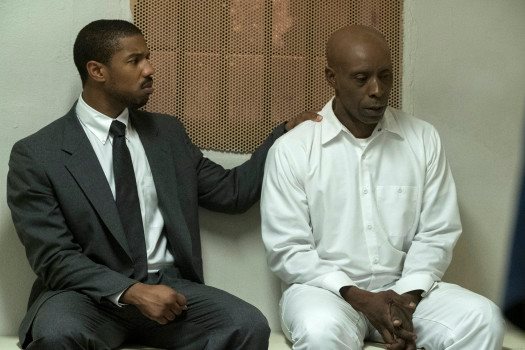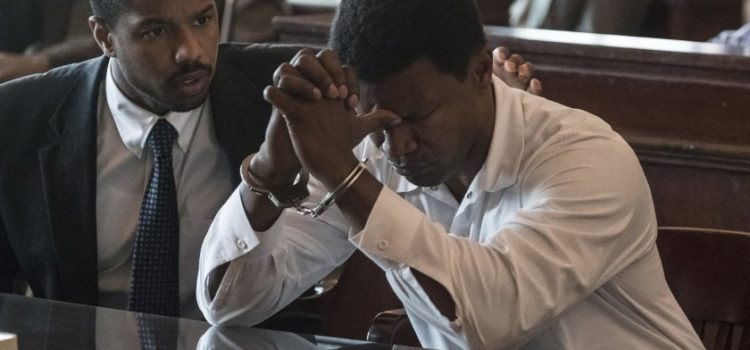By Lynn Venhaus
Attorney Bryan Stevenson’s own account of the Walter McMillian case, as recorded in the 2014 bestselling nonfiction book “Just Mercy: A Tale of Justice and Redemption,” is faithfully adapted on screen by writer-director Destin Daniel Cretton.
After earning a law degree from Harvard, Bryan Stevenson (Michael B. Jordan) sets up shop in Alabama, focusing on defending wrongly condemned Death Row inmates, and finding out many were not afforded proper representation.
McMillian (Jamie Foxx) is one of his first cases. He is sentenced to die in 1987 for the murder of an 18-year-old girl. Evidence overwhelmingly proves his innocence, but it’s an uphill battle because of racism and legal and political maneuvering.
While the film is basically a legal procedural, it pushes buttons – frustration, anger and a clear indication that justice is sometimes only for those who can afford a good lawyer.
Cretton, along with screenwriter Andrew Lantham, depicts the harsh reality of dealing with black-and-white issues in the deep South (and beyond) as it methodically details the ‘cover your ass’ local good-old-boy police and legal system.
What elevates this film, however, is the acting. With the customary outstanding portrayals one expects from Michael B. Jordan and Oscar winner Jamie Foxx, we are presented with the ‘so-what’ obstacles that have led real-life hero Stevenson to overturn convictions of dozens of innocent people.
The McMillian case, detailed on “60 Minutes,” is so obvious in its railroading of an innocent man that the struggles seem more outrageous as the film weaves its matter-of-fact account with all the subtlety of a freight train collision.
The supporting cast also excels in bringing clearly defined characters to life – especially Rob Morgan and O’Shea Jackson Jr. as Death Row inmates Herbert Richardson and Anthony Ray Hinton. Brie Larson, so good in Cretton’s film “Short Term 12,” conveys activist Eve Ansley’s plight as a Southern wife and mother.
Versatile character actor Tim Blake Nelson delivers one of his finest performances as a key witness, Ralph Myers, whose original testimony helped put McMillian in prison.
Stevenson’s work, through his Equal Justice Institute, shows how badly the criminal justice system is broken – more criminal than just – and the filmmakers have done a public service by bringing it to our attention.
“Just Mercy” won the Audience Award at the St. Louis International Film Festival in November. It’s easy to see why it strikes a chord with anyone who believes in truth and justice.

Genre: Drama, True Story
Director: Destin Daniel Cretton
Starring: Michael B. Jordan, Jamie Foxx, Brie Larson, Tim Blake Nelson, O’Shea Jackson Jr.
Rated: Rated PG-13 for thematic content including some racial epithets.
Lynn’s Grade: B+
A version of this review was originally published in the Times newspapers.

Lynn (Zipfel) Venhaus has had a continuous byline in St. Louis metro region publications since 1978. She writes features and news for Belleville News-Democrat and contributes to St. Louis magazine and other publications.
She is a Rotten Tomatoes-approved film critic, currently reviews films for Webster-Kirkwood Times and KTRS Radio, covers entertainment for PopLifeSTL.com and co-hosts podcast PopLifeSTL.com…Presents.
She is a member of Critics Choice Association, where she serves on the women’s and marketing committees; Alliance of Women Film Journalists; and on the board of the St. Louis Film Critics Association. She is a founding and board member of the St. Louis Theater Circle.
She is retired from teaching journalism/media as an adjunct college instructor.

